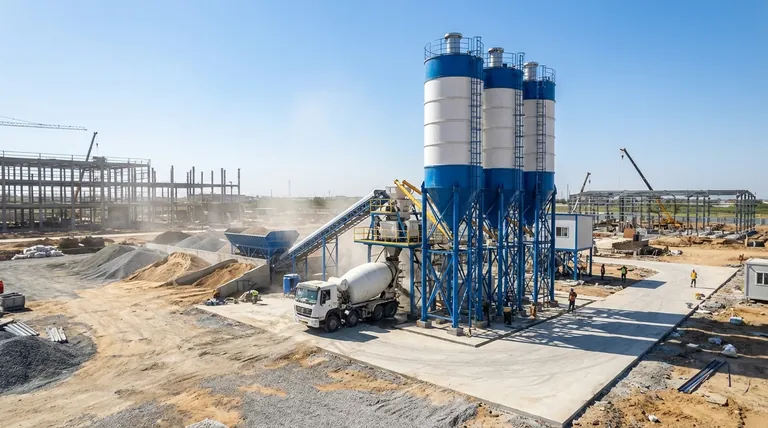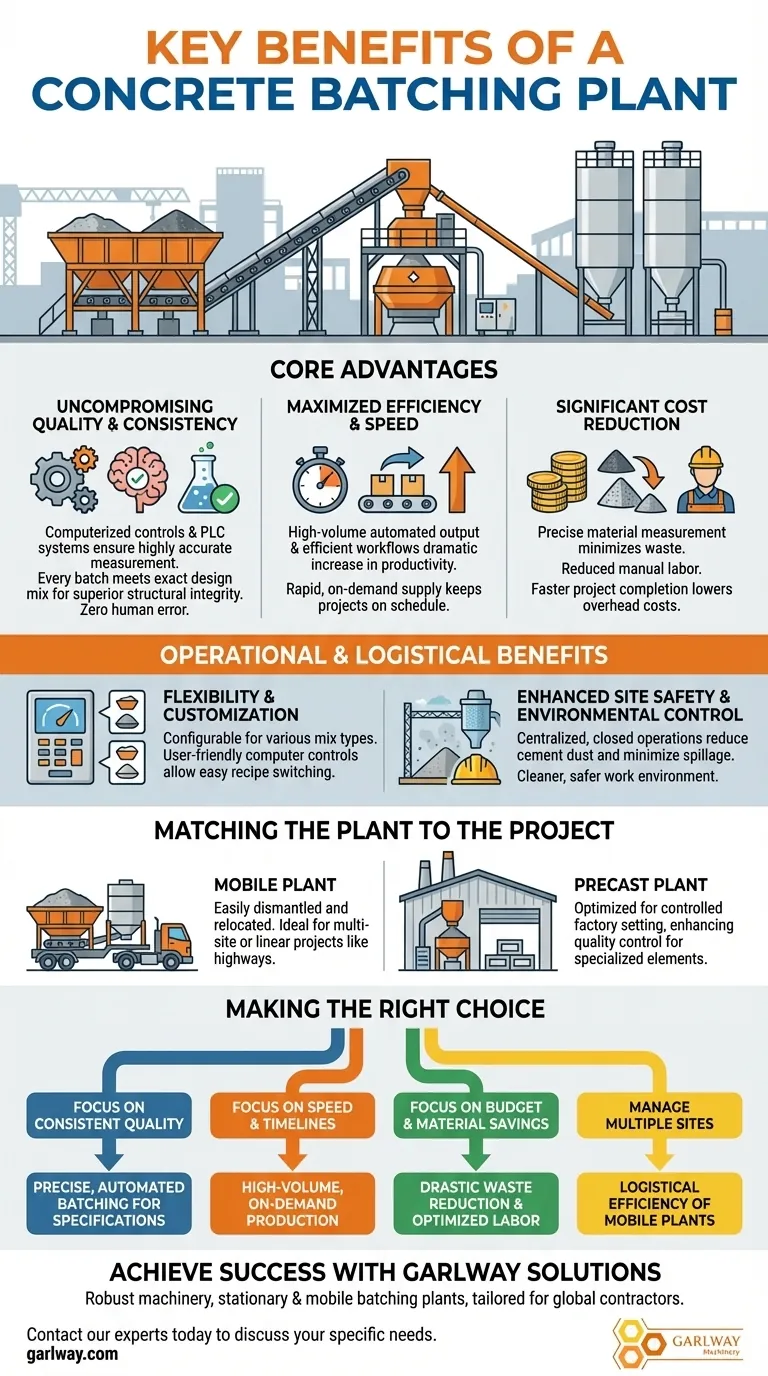At its core, a concrete batching plant introduces precision engineering into the messy world of construction. Its key benefits are superior quality control through automated and accurate measurement, a dramatic increase in production speed and efficiency, and significant cost savings driven by the reduction of material waste.
The fundamental shift is from manual, variable-quality mixing to an automated, factory-like process. This ensures every cubic meter of concrete meets exact specifications, directly improving structural integrity, project timelines, and budget control.

The Core Advantages of a Batching Plant
A concrete batching plant is designed to combine raw materials like sand, gravel, cement, and water into high-quality concrete. The benefits stem directly from automating and controlling this process.
Uncompromising Quality and Consistency
The single most important benefit is the ability to produce consistently high-quality concrete.
Manual mixing is prone to human error, leading to variations in strength and durability. A batching plant uses computerized controls and PLC systems for highly accurate measurement of every ingredient, ensuring each batch adheres to the precise design mix.
This level of quality control is pivotal for any construction project where structural integrity is paramount.
Maximized Efficiency and Speed
Batching plants are built for high-volume output.
Features like efficient belt feeding mechanisms and automated workflows dramatically increase productivity compared to manual methods. This guaranteed production speed helps keep construction projects on schedule.
For large-scale projects, this rapid, on-demand supply of concrete is a critical logistical advantage.
Significant Cost Reduction
Improved efficiency translates directly into cost savings in several key areas.
First, the precise measurement of materials like cement and aggregates minimizes waste, which can be a major expense. Second, the automation reduces the need for manual labor. Finally, faster project completion reduces overall overhead and labor costs.
Operational and Logistical Benefits
Beyond the primary advantages of quality and cost, batching plants offer significant operational improvements on a construction site.
Flexibility and Customization
Modern batching plants are not one-size-fits-all. They can be configured to produce many different types of concrete mixes, tailored to the specific needs of a project.
Designs can be customized, and the user-friendly computer controls allow operators to easily switch between different recipes as required.
Enhanced Site Safety and Environmental Control
Centralizing concrete production creates a safer and cleaner work environment.
Many plants feature closed operations, which significantly reduces the spread of cement dust and minimizes the environmental impact. This controlled process also reduces material spillage and on-site clutter.
Matching the Plant to the Project
Different project types demand different plant configurations.
A mobile concrete batching plant is designed to be easily dismantled and relocated. This makes it incredibly efficient for companies that manage multiple projects in different locations or for large-scale infrastructure projects that progress linearly, like highways or bridges.
A precast concrete batching plant is optimized for producing elements in a controlled factory setting, which further enhances quality control and safety for specialized products.
Understanding the Trade-offs and Selection Criteria
Choosing a plant is not just about buying the biggest or most advanced model. An objective evaluation of your specific needs is crucial to avoid costly mistakes.
The Risk of Over-Specification
It is essential to avoid unnecessary extravagance. Selecting a plant with capabilities far beyond your project's requirements leads to economic waste and an inefficient use of capital.
Focus on the standard configurations offered by manufacturers and only propose custom requirements if they solve a specific, identified need.
The Importance of Component Quality
When comparing prices from different suppliers, look beyond the headline number. Pay close attention to the configuration lists, specifically the manufacturers of key accessories and components.
A lower upfront cost can be misleading if it is achieved with inferior parts that will fail prematurely and cause costly downtime.
Defining Your Actual Need
The most effective choice is the one that best fits your operational reality. Carefully consider the size, quantity, and variety of concrete you need to produce. The goal is to find the most economical and effective solution for your work, not the "best" plant on the market.
Making the Right Choice for Your Project
Your decision should be guided by your primary project driver.
- If your primary focus is consistent structural quality: The precise, automated measurement offered by a batching plant is the only way to guarantee every batch meets engineering specifications.
- If your primary focus is speed and project timelines: The high-volume, on-demand production capability of a plant is your greatest asset for meeting aggressive deadlines.
- If your primary focus is budget control and material savings: The drastic reduction in material waste and optimized labor provided by a plant will deliver the strongest return on investment.
- If you manage multiple, geographically separate projects: The logistical efficiency of a mobile concrete batching plant offers unparalleled flexibility and convenience.
Ultimately, integrating a concrete batching plant is about applying manufacturing principles to construction to achieve more predictable and reliable results.
Summary Table:
| Key Benefit | Core Advantage |
|---|---|
| Quality & Consistency | Precise, automated ingredient measurement ensures every batch meets exact specifications. |
| Efficiency & Speed | High-volume, automated production keeps large-scale projects on schedule. |
| Cost Reduction | Minimizes material waste and optimizes labor for significant budget savings. |
| Flexibility & Safety | Customizable mixes and closed operations enhance project adaptability and site safety. |
Ready to achieve superior quality, efficiency, and cost control on your construction site?
At GARLWAY, we specialize in providing robust construction machinery, including stationary and mobile concrete batching plants, winches, and concrete mixers, tailored for construction companies and contractors globally. Our solutions are engineered to deliver the precise performance and reliability your projects demand.
Contact our experts today to discuss your specific needs and discover how a GARLWAY batching plant can be the cornerstone of your project's success.
Visual Guide

Related Products
- HZS180 Ready Mix Concrete Plant for Foundations with Sand and Cement
- HZS75 Concrete Batching Plant Cement Mixer Price Concrete Mixer Bunnings Mixing Plant
- HZS120 Ready Mix Concrete Batching Plant Commercial Mud Cement Mixer
- HZS35 Small Cement Concrete Mixing Batch Plant
- Portable Concrete Mixer Machine Equipment for Mixing Concrete
People Also Ask
- What are the factors influencing choice of a concrete mixing plant? Key Considerations for Efficiency
- How much does a batching plant cost? Uncover the True Investment for Your Project
- How does ready-mix work? A Guide to Efficient, High-Quality Concrete Delivery
- What are the advantages of ready mix concrete? Higher Quality, Efficiency & Cost Savings
- How to make ready mix concrete stronger? Boost Strength with Proven Mixing Techniques

















